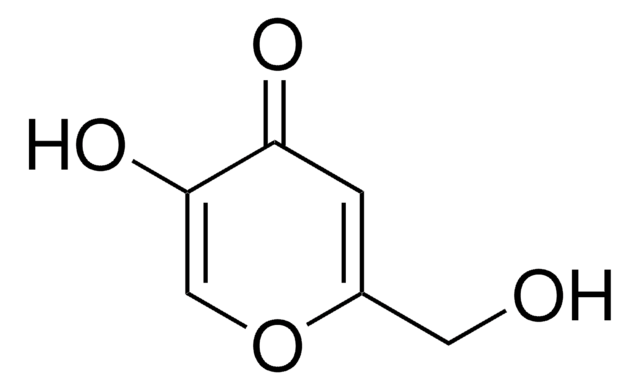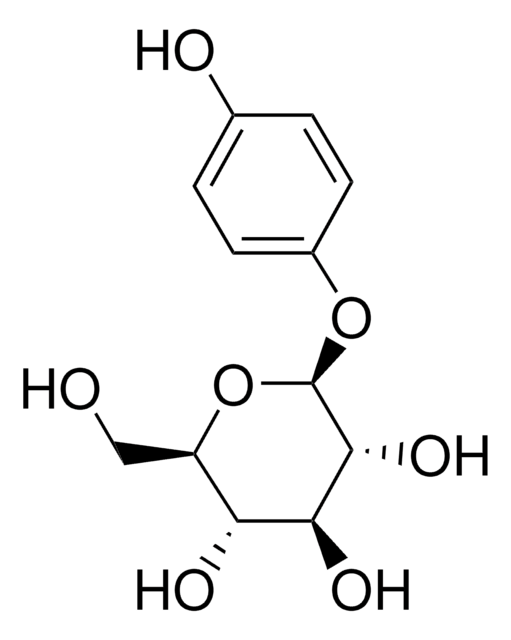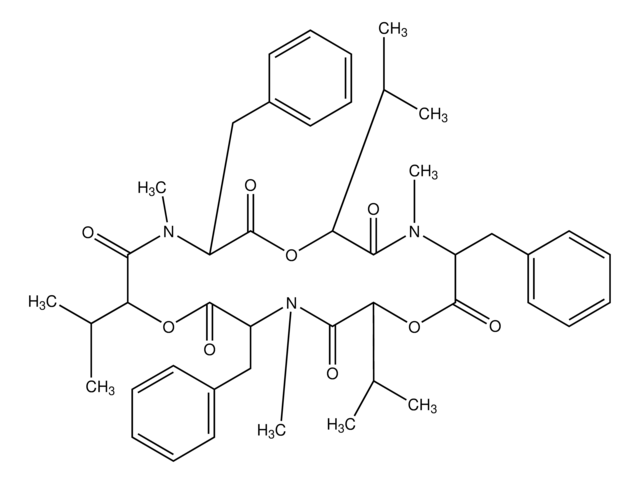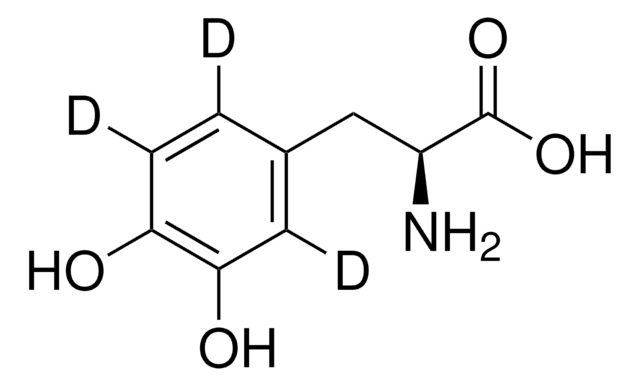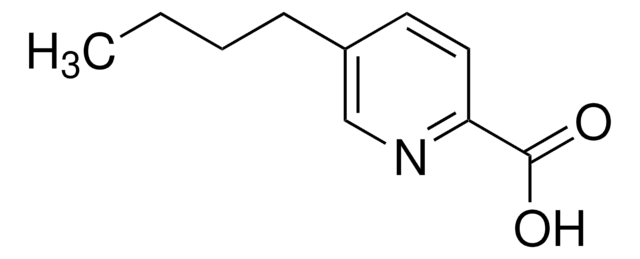M5269
Moniliformin sodium salt from Fusarium proliferatum
Sinónimos:
1-Hydroxycyclobut-1-ene-3,4-dione
Iniciar sesiónpara Ver la Fijación de precios por contrato y de la organización
About This Item
Fórmula lineal:
C4HO3Na
Número de CAS:
Peso molecular:
120.04
MDL number:
UNSPSC Code:
12352200
PubChem Substance ID:
NACRES:
NA.77
Productos recomendados
Quality Level
storage temp.
2-8°C
SMILES string
O=C1C(C=C1[O-])=O.[Na+]
InChI
1S/C4H2O3.Na/c5-2-1-3(6)4(2)7;/h1,5H;/q;+1/p-1
InChI key
FERDNJVXTWPNSA-UHFFFAOYSA-M
General description
Moniliformin (MON), a mycotoxin and small ionic molecule, is present in various Fusarium species including Fusarium avenaceum, Fusarium subglutinans and Fusarium proliferatum. It is present as sodium or potassium salt of semisquaric acid naturally. MON is also present in maize and small-grain cereals.
Application
Moniliformin sodium salt from Fusarium proliferatum has been used as a mycotoxin standard:
- to test its acute oral toxicity in mice
- to test its subacute toxic effects in rats
- in characterizing mycotoxins from Aspergillus
Biochem/physiol Actions
Moniliformin (MON) is implicated for its toxic potential and may lead to respiratory distress and progressive muscular weakness in rats. It inhibits the tricarboxylic acid (TCA) cycle oxidation step. By acting as a pyruvate substrate, MON effectively inhibits thiamine pyrophosphate cofactor dependant enzymes and blocks the gluconeogenesis pathway. ) Furthermore, MON also inhibits glutathione peroxidase and glutathione reductase leading to oxidative stress in myoblast.
signalword
Danger
hcodes
pcodes
Hazard Classifications
Acute Tox. 3 Oral
Storage Class
6.1A - Combustible acute toxic Cat. 1 and 2 / very toxic hazardous materials
wgk_germany
WGK 3
flash_point_f
Not applicable
flash_point_c
Not applicable
ppe
Eyeshields, Faceshields, Gloves, type P2 (EN 143) respirator cartridges
Elija entre una de las versiones más recientes:
¿Ya tiene este producto?
Encuentre la documentación para los productos que ha comprado recientemente en la Biblioteca de documentos.
Los clientes también vieron
H R Burmeister et al.
Applied and environmental microbiology, 37(1), 11-13 (1979-01-01)
Fusarium moniliforme NRRL 6322 produced about 600 mg of recoverable moniliformin, a mycotoxic metabolite, per kg of corn grit medium. The moniliformin was extracted from the grits with methanol, purified by preparative thin-layer chromatography, and crystallized from ether. The 50%
A Waskiewicz et al.
Food additives & contaminants. Part A, Chemistry, analysis, control, exposure & risk assessment, 27(5), 608-615 (2010-05-11)
The principal aim of this study was to estimate the formation of fumonisins (FB(1) and FB(2)), moniliformin (MON), and ergosterol (ERG) by Fusarium oxysporum and Fusarium proliferatum, while the formation of beauvericin (BEA) was estimated by the latter Fusarium species
R Kristensen et al.
Journal of applied microbiology, 102(4), 1071-1081 (2007-03-27)
To develop a multiplex identification method for trichothecene- and moniliformin-producing Fusarium species. In this article, we present a single nucleotide polymorphism (SNP) assay to simultaneously detect and identify 16 trichothecene- and moniliformin-producing Fusarium species. A number of SNP primers are
Martina Jonsson et al.
Food and chemical toxicology : an international journal published for the British Industrial Biological Research Association, 53, 27-32 (2012-12-04)
Moniliformin is a Fusarium mycotoxin highly prevalent in grains and grain-based products worldwide. In this study, the acute oral toxicity of moniliformin was assessed in Sprague-Dawley male rats according to OECD Guideline 423 with a single-dose exposure. Clinical observations and
Jens Laurids Sørensen et al.
Journal of agricultural and food chemistry, 57(4), 1632-1639 (2009-01-28)
Wet apple core rot (wACR) is a well-known disease of susceptible apple cultivars such as Gloster, Jona Gold, and Fuji. Investigations in apple orchards in Slovenia identified Fusarium avenaceum, a known producer of several mycotoxins, as the predominant causal agent
Nuestro equipo de científicos tiene experiencia en todas las áreas de investigación: Ciencias de la vida, Ciencia de los materiales, Síntesis química, Cromatografía, Analítica y muchas otras.
Póngase en contacto con el Servicio técnico